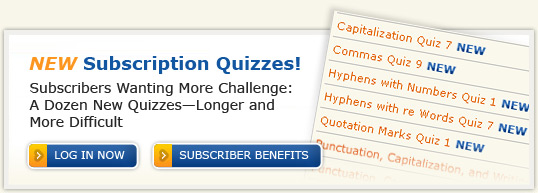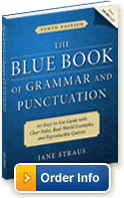|
Welcome to your GrammarBook.com E-Newsletter.

|
"I love reading and sharing your weekly E-Newsletters with staff members in order to improve their report writing skills."
- Margaret H.
"Thank you for the E-Newsletters and blog; they have been really helpful. I bought the Blue Book, too"
- Yacoub A.
"Thank you for your videos and the great E-Newsletters with amazing grammar tips. If you were still teaching I would take your classes."
- Brandy K.
|
|
|
Word nerds: Verbal custodians trapped in a time warp
A big drawback to a column like this is being perceived as having insufferable attitude: “So, Mr. Expert, I guess you think you’re so superior.”
It’s not like that. Word nerds do custodial work. A lot of brilliant people can’t write. Ernest Hemingway was a terrible speller. Word nerds don’t think they’re “better”—do janitors think they’re better than the office workers they clean up after?
I often wonder why I bother about details that concern so few normal people. Oh, I know what Arthur Conan Doyle said: “[T]he little things are infinitely the most important,” but on the other hand, I once saw Dick Cavett take a swipe at noted Harvard law professor-author Alan Dershowitz by correcting his grammar. Dershowitz made a sour (but unperturbed) face and shot back that unlike Cavett, he was too busy making a difference in the world to worry about language trivia.
So it’s not about word nerds’ delusions of superiority. We feel like anachronisms, displaced in a world of shifting values and priorities. We live in an idealized past. We each have our own preferred era, be it the time of Shakespeare or Swift or Dickens or Twain or Shaw, when people read a lot more and savored the mot juste.
Oh, and everyone you knew could write, spell, and punctuate, and felt enriched by a good vocabulary.
Anyway, onward to this week’s entries of infamy…
Irregardless I’ve heard a lot of bright people say this nonsense word, which results from confusing and combining regardless and irrespective. If people would just think about it, what’s that dopey ir- doing tacked on? In technical terms, ir- is an “initial negative particle.” So if “irregardless” means anything, it means “not regardless” when its hapless speaker is trying to say the exact opposite.
Center around The whole play centers around the consequences of ill-gotten gains. This common, misbegotten expression results from the unhappy union of two similar terms: center on and revolve around. Because the phrases are roughly synonymous, if you use them both enough, they merge in the mind. What’s annoying about “center around” is that it’s imprecise, and disheartens readers who take writing seriously. The center is the point in the middle. How, exactly, would something center around? You get dizzy trying to picture it.
Hone in This is another mongrel, like the two that preceded it. It’s the brain-dead combo of hone and home in. We simply can’t allow confusion to be the basis of acceptable changes in the language. In recent years, “hone in” has achieved an undeserved legitimacy for the worst of reasons: the similarity, in sound and appearance, of n and m. Honing is a technique used for sharpening cutting tools and the like. To home in, like zero in, is to get something firmly in your sights: get to the crux of a problem.
Reticent This trendy word properly means “uncommunicative,” “reserved,” “silent.” But sophisticates who like to fancy up their mundane blather are now using it when they mean “reluctant.” I was reticent to spend so much on a football game. When I hear something like that, I wish the speaker would just reticent the heck up.
Allude Allude to means mention indirectly. In one of its most unspeakable moves, Webster’s lists refer as a synonym. Horrors! When you refer to something, it’s a direct transaction: I refer to Section II, paragraph one, Your Honor. When you allude to something or someone, you don’t come out and say it; you’re being subtle, sly or sneaky: “Someone I know better wise up.”
Off (of) “Hey! You! Get off of my cloud,” sang the Rolling Stones, unnecessarily. The of is extraneous, and off of is what’s known as a pleonasm. That means: starting now, avoid it.
Couple (of) Hey, gimme a couple bucks, wouldja? When I was a kid, this is how neighborhood tough guys talked, while cracking their chewing gum. Don’t drop the of; one more little syllable won’t kill you.
Today’s grammar tip was contributed by veteran copy editor and word nerd Tom Stern.
Due to the E-Newsletter's large readership, please submit your English usage questions through GrammarBook.com's "Grammar Blog." |
|
Free BONUS Quiz For You!
[[firstname]], because you are a subscriber to the newsletter, you get access to one of the Subscription Members-Only Quizzes. Click here to take a Confusing Words and Homonyms Quiz and get your scores and explanations instantly!

"So convenient...hundreds of quizzes in one click."
[[firstname]], Subscribe to receive hundreds of English usage quizzes not found anywhere else!
- Take the quizzes online or download and copy them.
- Get scored instantly.
- Find explanations for every quiz answer.
- Reproduce the quizzes to your heart's content.
- EASY to use.
- No software to download.
- No setup time.
- A real person to help you if you have any questions!
"Fun to test my skills!" "The explanations really help...thanks!"
Your choice: Subscribe at the $29.95 or $99.95 level ($30 off - regularly $129.95).
"I download the quizzes for my students who don't have computer access."
Subscribe today to receive hundreds of English usage quizzes not found anywhere else!
"Makes learning English FUN!"
 |
Don't need all the quizzes at once?
You can now purchase the same quizzes individually for ONLY 99¢ each. Purchase yours here. |

Get Yours Today!
Get Amazon’s #1 Bestseller in Four Categories!
#1 in Grammar
#1 in Reading
#1 in Lesson Planning
#1 in Vocabulary |
The Blue Book of Grammar
and Punctuation by Jane Straus
An indispensable tool for busy professionals, teachers, students, homeschool families, editors, writers, and proofreaders.
Now available in print AND as an e-Book! Over 2000 copies are purchased every month!
Order Your Copy Today!
- Hundreds of Grammar, Punctuation, Capitalization, and Usage Rules
- Real-World Examples
- Spelling / Vocabulary / Confusing Words
- Quizzes with Answers
|
View the entire contents online
Discounts available for schools, bookstores, and multiple copies. Order Today!
Wordplay 
Thanks to reader Rick B. for submitting these actual carelessly worded signs.
Notice in a farmer's field:
THE FARMER ALLOWS WALKERS TO CROSS THE FIELD FOR FREE, BUT THE BULL CHARGES.
Message on a leaflet:
IF YOU CANNOT READ, THIS LEAFLET WILL TELL YOU HOW TO GET LESSONS.
Learn all about who and whom, affect and effect, subjects and verbs, adjectives and adverbs, commas, semicolons, quotation marks, and much more by just sitting back and enjoying these easy-to-follow lessons. Tell your colleagues (and boss), children, teachers, and friends. Click here to watch. |







